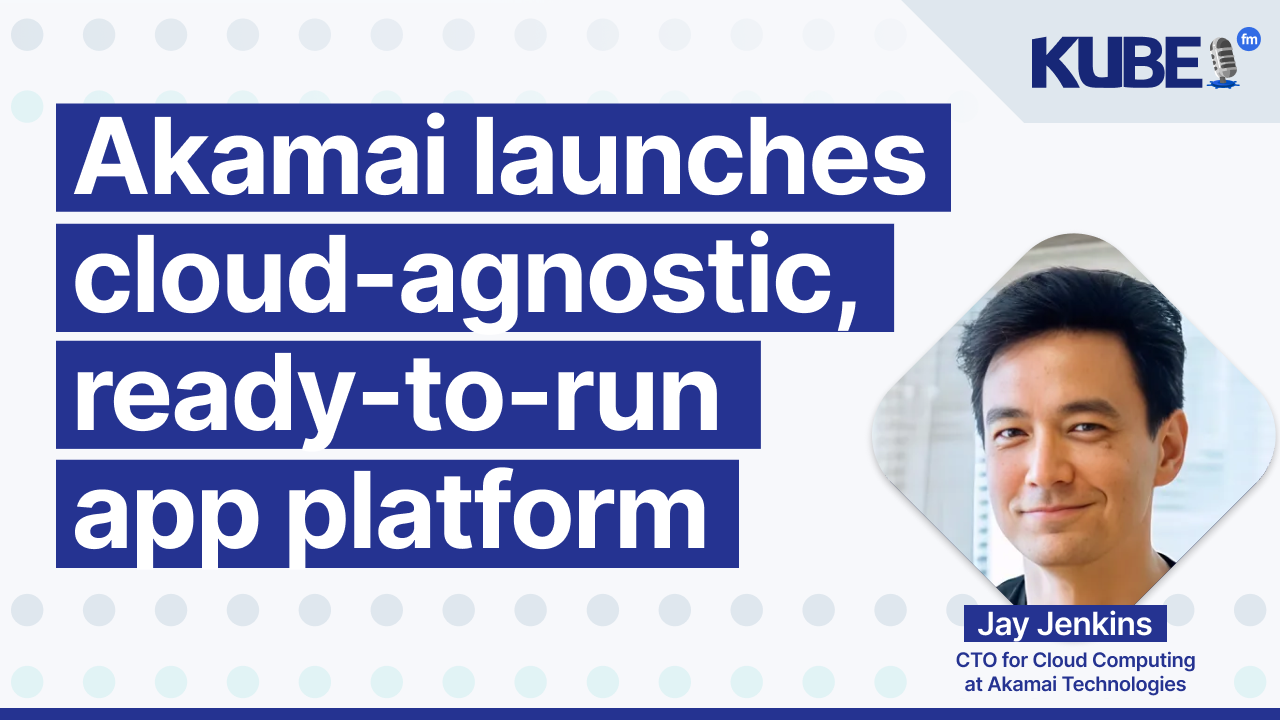Akamai launches cloud-agnostic, ready-to-run app platform
Nov 22, 2024
Akamai has announced the launch of their new App Platform, a solution that simplifies the deployment of upstream Kubernetes projects with just a few clicks.
The platform addresses a significant pain point in enterprise Kubernetes adoption by eliminating the complex setup process that typically requires dedicated platform engineering teams.
App Platform is completely open source and free to use, with costs only applying to the underlying infrastructure resources.
Transcription
Bart: Who are you, what's your role, and who do you work for?
Jay: Hi, my name is Jay Jenkins. I'm the CTO for cloud computing at Akamai.
Bart: What do you want to share with us today?
Jay: So yesterday, we launched Akamai App Platform, a platform that allows you to quickly deploy upstream Kubernetes projects into your Kubernetes cluster.
Bart: And what problem does Akamai App Platform solve?
Jay: It solves quite a few problems for customers struggling to implement an enterprise-ready Kubernetes. Kubernetes itself has become a platform for other platforms, and you tend to need to install many of these other platforms before your developers can start working. Akamai App Platform allows you to quickly deploy those upstream projects needed to support your developers with just a few clicks.
Bart: Could you share a bit about the before and after of this announcement?
Jay: So, before Akamai App Platform, your users would need to install many of these upstream projects themselves, configuring each of them and connecting each of them together before they could actually start deploying onto these platforms. Perhaps you've created a platform engineering team that's required to develop that platform to take that toil away from those developers. However, that same toil has now been centralized with that platform engineering team. Now, you can get that platform ready in a matter of minutes. Whether it's your developers doing those deployments or your platform engineering team doing those deployments, they're now bootstrapped and ready to go, ready to deploy.
Another thing that has changed is that before, you had to worry about which tools to implement. We've actually taken the best tools and provided highly opinionated implementations of each of these tools. You're able to modify and change those tools according to what you need. We really want to make sure, in the words of Alan Kay, that we're making the simple things simple and the complex things possible. Another thing is that before, you had to worry about the security of the platform yourself and manage those tools in order to implement that security. After, you now have that robust security already installed and ready to go.
Bart: Is Akamai App Platform open source and part of the CNCF landscape?
Jay: App Platform is open source; however, it is not currently part of the CNCF landscape.
Bart: What's Akamai's business model?
Jay: So Akamai provides the Akamai App Platform absolutely free because it's based on open source and you can install that anywhere. We didn't feel it was right to charge for that. But what we wanted to ensure is that we removed a lot of the toil for people trying to adopt Kubernetes. Once you install App Platform, the Kubernetes clusters, the storage required, and the high availability systems that are required are in fact charged for. That is what you're charged for - the resources required to run the App Platform included.
Bart: Who are your main competitors?
Jay: I guess the main competitors in this space would be your own internal teams that are doing all of this work themselves. For a lot of large enterprises, they've already done the hard work and created these platforms internally. But if you're just getting started with Kubernetes or just getting started with platform engineering, it's a great, easy way to bootstrap, get started quickly, and get on your journey.
Bart: And what differentiates Akamai App Platform from perhaps those in-house built platforms that some developers might currently be using?
Jay: There are obvious benefits to doing it yourself. If you have a specialized environment, it makes sense to invest time in customizing an App Platform to meet your needs. However, this requires significant effort. The Akamai App Platform for Kubernetes has been developed over five years. Instead of doing it yourself, consider using the App Platform to accelerate your journey and get started quickly.
Bart: What should we expect next from Akamai App Platform and Akamai?
Jay: So, from Akamai App Platform is currently in beta. As we move towards GA, we're going to get a lot of feedback from customers in terms of what they need and which upstream projects are important to them. Another thing we're looking at is the extensibility of the platform. The platform itself is extensible, but we want to make sure it's easy for developers to integrate the projects they need to create a platform for their developers or to support custom applications they're launching internally. For Akamai in general, we're going to focus on Akamai Cloud Computing. App Platform actually helps with distributed computing because it helps people get started with Kubernetes faster. Over time, you'll be able to place these workloads wherever you want around the globe.

